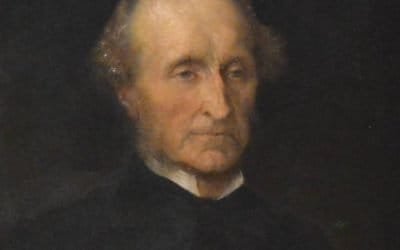A central tool for governments to maintain their authority in society and their control over people’s lives is the ability to make the citizenry accept and use their monopoly medium of exchange.
Richard M. Ebeling
Book Review: Popular Economics: What the Rolling Stones, Downton Abbey, and LeBron James Can Teach You about Economics
By taxing income, businesses, and estates, government siphons off part of the ability for people to do the work, savings, and investment out of which wealth, opportunities, and prosperity come.
Capitalism Supports Free Open Unions and Not Compulsory “Closed Shop” Ones
On the surface, labor unions make their appeal to society with rhetoric of claiming to want to better the conditions of all workers seeking gainful and income-enhancing employment. What is not as clearly seen are the indirect and usually unintended effects from compulsory unionism that end up keeping far too many in poverty and less remunerative jobs that the supporters of labor unions say they wish to help.
The Benevolence of Capitalism vs The Paternalism of the Welfare State
Before the arrival of modern welfare state, voluntary, private-sector institutions had evolved to serve as the market providers for many of those “social services” now viewed as the near-exclusive prerogative of the government. Unfortunately, after nearly a century of increasing political and cultural collectivism, the historical memory of the pre-welfare state era has all but been lost.
There Is No Social Security Santa Claus
Social Security is financial unsustainable and morally bankrupt.
A Gold Standard Can Limit Government Monetary Abuse
The real long-run goal of monetary reform should be the denationalization of money. That is, the separation of money from the state by ending of central banking, altogether. In its place would emerge private, competitive free banking – a truly market-based money and banking system.
“Democratic Socialism” Means The Loss of Liberty
The “freedom” about which Bernie Sanders speaks, and before him Franklin Roosevelt, in fact, involves a loss of liberty into an even greater degree of political paternalism.
Socialism: An Ideology of Death and Destruction
The attempt to establish a comprehensive socialist system in many parts of the world over the last one hundred years has been one of the cruelest and most brutal episodes in human history.
When The Supreme Court Stopped FDR’s Economic Fascism in America
On May 27, 1935, in a unanimous decision the nine members of the Supreme Court said there were constitutional limits beyond which the federal government could not go in claiming the right to regulate the economic affairs of the citizenry. It was a glorious day in American judicial history and is worth remembering.
Bill Gates, Climate Change, Capitalism and Tragedy of the Commons
If “climate change” and “global warming” are, in fact, problems facing people on Planet Earth, it is due to an atmospheric tragedy of the commons.
Bill Gate’s Solution to Climate Change Reveals His Misunderstanding of Capitalism and Free Markets
If “climate change” and “global warming” are, in fact, problems facing people on Planet Earth, it is due to an atmospheric tragedy of the commons.
Money and Banking is Too Important to Leave to Central Banks
Governments and their central banks have usurped market-based money systems to serve the plundering purposes of kings, parliaments, and special interest groups.
John Stuart Mill: Setting Liberals on the Road to Socialism
One of the great voices for personal liberty was that of the British economist and political philosopher, John Stuart Mill. His essay, “On Liberty,” though penned well over 150 years ago, is a classic statement that the individual should be respected in his right of...
Why Government Deficits and Debt Do Matter
Why it would desirable to incorporate a balanced budget amendment into the U.S. Constitution.
Free Trade Benefits vs. Fears of Foreign Goods
All who participate gain from international trade, and all are made poorer to the extent that governments interfere or prohibit the freedom of trade among the peoples of the world.
Consumers’ Sovereignty and Natural vs. Contrived Scarcities
One of the great myths about the capitalist system is the presumption that businessmen make profits at the expense of the consumers and workers in society. Nothing could be further from the truth. In the free market, consumers are the sovereign rulers who determine...
Israel Kirzner: Entrepreneurship, Competition and the Market Process
On October 13th, the 2014 Nobel Prize in Economics was announced in Stockholm, Sweden, with French economist, Jean Tirole, the recipient for his work on developing models to better assist governments in regulating private enterprise. A couple of weeks earlier, Reuters...
The Berlin Wall and the Spirit of Freedom
The history of the Berlin Wall and the collectivist ideology behind it should remind us of how important a loss of any of our freedom can be as we determine in what direction – toward greater individual freedom and free enterprise or more government command and control – we wish our country to move in the 21st century.
Fed Follies: Central Bank Continues to Force Economy in Wrong Direction
Why did the Federal Reserve’s monetary policy of price level stabilization in the 1920s result in the Great Depression of the early 1930s?
Laissez-Faire Mr. President
For nearly six years, now, you have declared your intention and desire of being my Nanny-in-Chief. Your original campaign slogan of “Hope and Change” was really a promise of “Control and Command.” Well, Mr. President, I have a request: Mind your own business.
The Inequality Trap Distracts from the Real Issue of Freedom: Thomas Piketty’s Capital in the Twenty-First Century
Rather than asking the source or origin of that wealth — production or plunder –the egalitarians like Thomas Piketty merely see that some have more wealth than others and condemn such an “unequal distribution,” in itself.
Subscribe for free.
Latest pro-Capitalism goodness sent weekly to your email box.
No spam. Unsubscribe anytime.


















